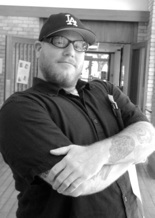This piece is part of an on-going blog series called Plurality 2.0 (watch video here). Full schedule of guest authors throughout April and May is available here.
Ryan Kemp-Pappan is Associate Pastor for Spiritual Direction at Douglass Blvd Christian Church in Louisville, Kentucky. Seeking to connect the local community in purpose, care, compassion, and intimacy, following the rich tradition of social action and community organization of the Christian Church (Disciples of Christ). Ryan blogs at The Fettered Heart.
“Yes, God so loved the world as to give the Only Begotten One, that whoever believes may not die, but have eternal life.â€
John 3:16 [The Inclusive Bible]
 This verse is probably the most famous verse of scripture. When I get past the rainbow wig-wearing guy holding a sign emblazoned with John 3:16, I witness in this verse God’s breaking into the mundane and asserting divinity within its still dullness. Most often I have heard this verse used to convict or prod people into committing their life to follow Jesus [the] Christ or else perish in an eternal fiery damnation.
This verse is probably the most famous verse of scripture. When I get past the rainbow wig-wearing guy holding a sign emblazoned with John 3:16, I witness in this verse God’s breaking into the mundane and asserting divinity within its still dullness. Most often I have heard this verse used to convict or prod people into committing their life to follow Jesus [the] Christ or else perish in an eternal fiery damnation.
When I read this verse, I stop at “the world†and wonder. The world is huge. The world is currently populated with 6.7 billion people. There are 2.1 billion Christians, 1.5 billion Muslims, 1.1 billion secular, non-religious, agnostic, or atheists, 900 million Hindus, 376 million Buddhists, 14 million Jews, and over 900 million animist, traditional, indigenous, spiritualists in the world [link]. Billions of people with billions of ideas—that is a lot of beliefs.
I am sure that if asked “what†and “why†one believes, regardless of religion practiced, you would get a wide array of answers. I wrestle with the many religious languages available to interpret the divine presence in my life. I find myself struggling with the “Christian Faith†as I find depth and new ways to communicate my experience with the divine.
With this ever informing understanding I read John 3:16 with a BELONG, BEHAVE, BELIEVE [Inspired via a Tweetversation with @landonw] rather than the contemporary “orthodox†protestant persuasion of Believe, Behave, Belong. I testify to the demand that plurality asserts upon those that dare enter the BELONG portion of the process or relationship with Jesus the Christ.
With a pluralistic rendering of John 3:16 I must belong in order to behave and grow to believe. God beckons us to belong to a better way of being, a way that requires us to care for and respond to the needs of the Other. As we care for and respond to the Other, we are bound together to form communities that connect what God freely gives to All of “the world.â€
A contemporary “orthodox†protestant reading of John 3:16 demands that we must first believe in order to behave and to belong to God. We live in a pluralist society where the communities in which we live are comprised of many ways of being. The contemporary “orthodox†protestant of yesterday is emigrating to the safety of homogeny, where they have lost their salt. Here fear, control, and righteousness can be mistaken for love, grace, and faith.
RabiÊ¿a al-Basri, the famous Sufi prophetess & mystic, was wandering the streets of Basra carrying a bucket of water in one hand and a burning torch in the other. When asked why she was carrying the torch and the bucket, she said, “I want to set fire to heaven with this flame and put out the fire of hell with this water. They block the way to God. I do not want to worship from fear of punishment or for the promise of reward, but simply for the divine love of God.” It is more important to BELONG than it ever is to BEHAVE or BELIEVE.
To BEHAVE, one must first secure reason to in the BELONGing to a community. Plurality is an advantage to formation of community and celebrates the diversity and divinity of the indwelling Creator revealed in all of creation.
As I endeavor to live in our pluralistic nation I commit to the humble position that I am finite and my understanding of the divine is equally finite. I live in a manner as to not assert my authority over that of another voice in the divine conversation. For belief is rooted in the loving blessing given to “the world.†Who am I to claim ownership in such an awesome undertaking I will never truly understand? I stand in the tension of multiple interpretations of the divine call to “come and follow.â€